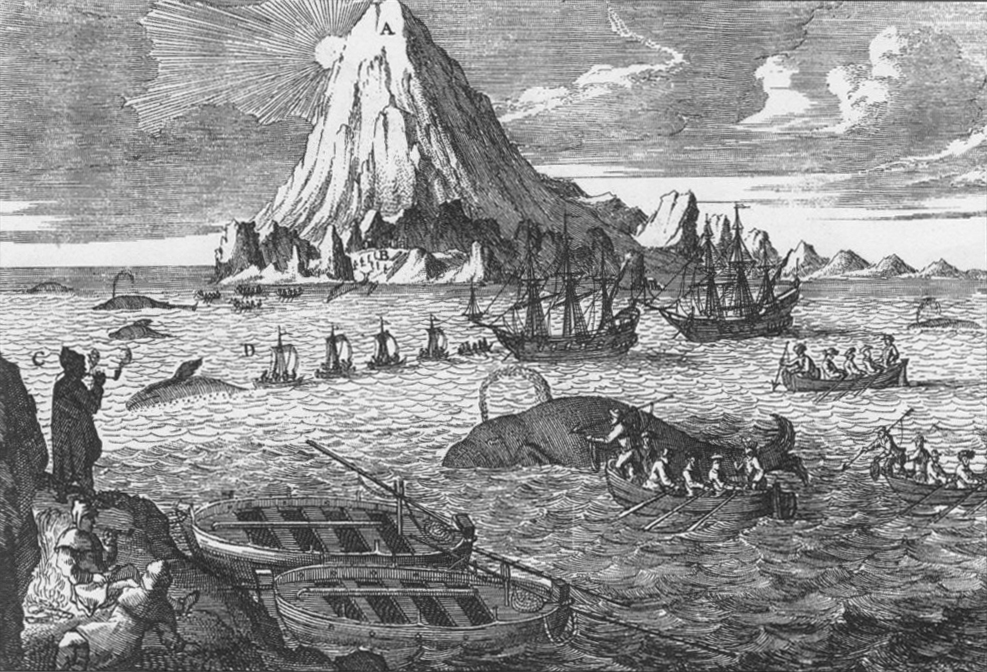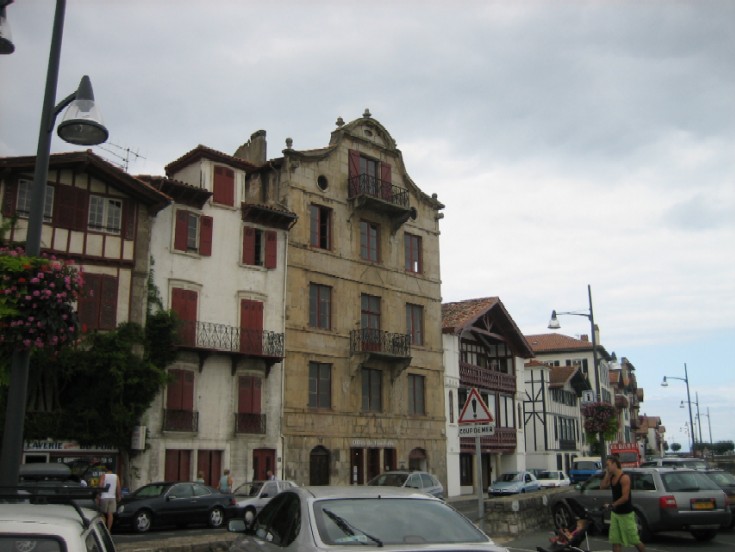|
Martin De Hoyarçabal
Martin de Hoyarçabal (Martin Oihartzabal in modern spelling) was a French Basque people, Basque mariner. Little is generally known about his life. He was born in Ciboure, in the Iparralde, the French Basque Country. He is recognized for publishing one of the first Newfoundland Sailing directions, pilots, a book which describes places and distances to aid sailors in navigation, in 1579. ''Les voyages aventureux du Capitaine Martin de Hoyarsabal, habitant du çubiburu'' was published in French and was widely used by French and Spain, Spanish sailor, mariners for almost a century. Hoyarçabal's ''Navigational Pilot'' The ''Pilot'' is the only known extant work by Hoyarçabal. As a reference work, the ''Navigational Pilot'' was invaluable for ships traveling in the Newfoundland area. The following is an example taken from Hoyarçabal's work; in this text, Hoyarçabal is giving distances between several places in Colony of Newfoundland, Newfoundland: * *With Cape S. Marie & Plais ... [...More Info...] [...Related Items...] OR: [Wikipedia] [Google] [Baidu] |
Basque People
The Basques ( or ; eu, euskaldunak ; es, vascos ; french: basques ) are a Southwestern European ethnic group, characterised by the Basque language, a common culture and shared genetic ancestry to the ancient Vascones and Aquitanians. Basques are indigenous to, and primarily inhabit, an area traditionally known as the Basque Country ( eu, Euskal Herria) — a region that is located around the western end of the Pyrenees on the coast of the Bay of Biscay and straddles parts of north-central Spain and south-western France. Etymology The English word ''Basque'' may be pronounced or and derives from the French ''Basque'' (), itself derived from Gascon ''Basco'' (pronounced ), cognate with Spanish ''Vasco ''(pronounced ). Those, in turn, come from Latin ''Vascō'' (pronounced ; plural '' Vascōnes''—see history section below). The Latin generally evolved into the bilabials and in Gascon and Spanish, probably under the influence of Basque and the related Aquitani ... [...More Info...] [...Related Items...] OR: [Wikipedia] [Google] [Baidu] |
Starboard
Port and starboard are nautical terms for watercraft and aircraft, referring respectively to the left and right sides of the vessel, when aboard and facing the bow (front). Vessels with bilateral symmetry have left and right halves which are mirror images of each other. One asymmetric feature is where access to a boat, ship, or aircraft is at the side, it is usually only on the port side (hence the name). Side Port and starboard unambiguously refer to the left and right side of the vessel, not the observer. That is, the port side of the vessel always refers to the same portion of the vessel's structure, and does not depend on which way the observer is facing. The port side is the side of the vessel which is to the left of an observer aboard the vessel and , that is, facing forward towards the direction the vehicle is heading when underway, and starboard side is to the right of such an observer. This convention allows orders and information to be given unambiguously, witho ... [...More Info...] [...Related Items...] OR: [Wikipedia] [Google] [Baidu] |
French Explorers
French (french: français(e), link=no) may refer to: * Something of, from, or related to France ** French language, which originated in France, and its various dialects and accents ** French people, a nation and ethnic group identified with France ** French cuisine, cooking traditions and practices Fortnite French places Arts and media * The French (band), a British rock band * "French" (episode), a live-action episode of ''The Super Mario Bros. Super Show!'' * ''Française'' (film), 2008 * French Stewart (born 1964), American actor Other uses * French (surname), a surname (including a list of people with the name) * French (tunic), a particular type of military jacket or tunic used in the Russian Empire and Soviet Union * French's, an American brand of mustard condiment * French catheter scale, a unit of measurement of diameter * French Defence, a chess opening * French kiss, a type of kiss involving the tongue See also * France (other) * Franch, a surname * French ... [...More Info...] [...Related Items...] OR: [Wikipedia] [Google] [Baidu] |
French-Basque People
The French Basque Country, or Northern Basque Country ( eu, Iparralde (), french: Pays basque, es, País Vasco francés) is a region lying on the west of the French department of the Pyrénées-Atlantiques. Since 1 January 2017, it constitutes the Basque Municipal Community ( eu, Euskal Hirigune Elkargoa, links=no; french: Communauté d'Agglomeration du Pays Basque, links=no) presided over by . It includes three former historic French provinces in the north-east of the traditional Basque Country totalling : Lower Navarre (french: Basse-Navarre, links=no; eu, Nafarroa Beherea, links=no), until 1789 nominally Kingdom of Navarre, with ; Labourd (), with ; Soule (), with . The population included in the Basque Municipal Community amounts to 309,723 inhabitants distributed in 158 municipalities. It is delimited in the north by the department of Landes, in the west by the Bay of Biscay, in the south by the Southern Basque Country and in the east by Béarn (although in the Bé ... [...More Info...] [...Related Items...] OR: [Wikipedia] [Google] [Baidu] |
French Sailors
French (french: français(e), link=no) may refer to: * Something of, from, or related to France ** French language, which originated in France, and its various dialects and accents ** French people, a nation and ethnic group identified with France ** French cuisine, cooking traditions and practices Fortnite French places Arts and media * The French (band), a British rock band * "French" (episode), a live-action episode of ''The Super Mario Bros. Super Show!'' * ''Française'' (film), 2008 * French Stewart (born 1964), American actor Other uses * French (surname), a surname (including a list of people with the name) * French (tunic), a particular type of military jacket or tunic used in the Russian Empire and Soviet Union * French's, an American brand of mustard condiment * French catheter scale, a unit of measurement of diameter * French Defence, a chess opening * French kiss, a type of kiss involving the tongue See also * France (other) * Franch, a surname * French ... [...More Info...] [...Related Items...] OR: [Wikipedia] [Google] [Baidu] |
People From Labourd
A person ( : people) is a being that has certain capacities or attributes such as reason, morality, consciousness or self-consciousness, and being a part of a culturally established form of social relations such as kinship, ownership of property, or legal responsibility. The defining features of personhood and, consequently, what makes a person count as a person, differ widely among cultures and contexts. In addition to the question of personhood, of what makes a being count as a person to begin with, there are further questions about personal identity and self: both about what makes any particular person that particular person instead of another, and about what makes a person at one time the same person as they were or will be at another time despite any intervening changes. The plural form "people" is often used to refer to an entire nation or ethnic group (as in "a people"), and this was the original meaning of the word; it subsequently acquired its use as a plural form of ... [...More Info...] [...Related Items...] OR: [Wikipedia] [Google] [Baidu] |
Year Of Death Unknown
A year or annus is the orbital period of a planetary body, for example, the Earth, moving in its orbit around the Sun. Due to the Earth's axial tilt, the course of a year sees the passing of the seasons, marked by change in weather, the hours of daylight, and, consequently, vegetation and soil fertility. In temperate and subpolar regions around the planet, four seasons are generally recognized: spring, summer, autumn and winter. In tropical and subtropical regions, several geographical sectors do not present defined seasons; but in the seasonal tropics, the annual wet and dry seasons are recognized and tracked. A calendar year is an approximation of the number of days of the Earth's orbital period, as counted in a given calendar. The Gregorian calendar, or modern calendar, presents its calendar year to be either a common year of 365 days or a leap year of 366 days, as do the Julian calendars. For the Gregorian calendar, the average length of the calendar year (the mea ... [...More Info...] [...Related Items...] OR: [Wikipedia] [Google] [Baidu] |
Year Of Birth Unknown
A year or annus is the orbital period of a planetary body, for example, the Earth, moving in its orbit around the Sun. Due to the Earth's axial tilt, the course of a year sees the passing of the seasons, marked by change in weather, the hours of daylight, and, consequently, vegetation and soil fertility. In temperate and subpolar regions around the planet, four seasons are generally recognized: spring, summer, autumn and winter. In tropical and subtropical regions, several geographical sectors do not present defined seasons; but in the seasonal tropics, the annual wet and dry seasons are recognized and tracked. A calendar year is an approximation of the number of days of the Earth's orbital period, as counted in a given calendar. The Gregorian calendar, or modern calendar, presents its calendar year to be either a common year of 365 days or a leap year of 366 days, as do the Julian calendars. For the Gregorian calendar, the average length of the calendar year ( ... [...More Info...] [...Related Items...] OR: [Wikipedia] [Google] [Baidu] |
Whaling
Whaling is the process of hunting of whales for their usable products such as meat and blubber, which can be turned into a type of oil that became increasingly important in the Industrial Revolution. It was practiced as an organized industry as early as 875 AD. By the 16th century, it had risen to be the principal industry in the Basque coastal regions of Spain and France. The industry spread throughout the world, and became increasingly profitable in terms of trade and resources. Some regions of the world's oceans, along the animals' migration routes, had a particularly dense whale population, and became the targets for large concentrations of whaling ships, and the industry continued to grow well into the 20th century. The depletion of some whale species to near extinction led to the banning of whaling in many countries by 1969, and to an international cessation of whaling as an industry in the late 1980s. The earliest known forms of whaling date to at least 3000 BC. Coasta ... [...More Info...] [...Related Items...] OR: [Wikipedia] [Google] [Baidu] |
Navarro-Lapurdian Dialect
Navarro-Labourdin or Navarro-Lapurdian ( eu, nafar-lapurtera) is a Basque dialect spoken in the Lower Navarre and Labourd (Lapurdi) former provinces of the French Basque Country (in the Pyrénées Atlantiques ''département''). It consists of two dialects in older classifications, Lower Navarrese and Labourdin. It differs somewhat from Upper Navarrese spoken in the Peninsular Basque Country. Lower Navarrese or Low Navarrese (Standard Basque: ''behe-nafarrera'') is actually two subdialects, eastern and western; the western dialect continues into eastern Labourd. Labourdin (French ''labourdin''; Standard Basque ''lapurtera'', locally ''lapurtara'') is spoken in western Lapurdi. Labourdin is felt by speakers of other dialect to be clear-cut and elegant, retaining like other northern Basque dialects the consonant , and it was used along with Gipuzkoan and High Navarrese in the creation of the Batua, a standardised form of Basque intended for teaching and the media. Classic Lab ... [...More Info...] [...Related Items...] OR: [Wikipedia] [Google] [Baidu] |
Ciboure
Ciboure (; ,ZIBURU meaning 'end of bridge') is a in the department in south-western . It lies across the river |

.jpg)
_1938.jpg)


